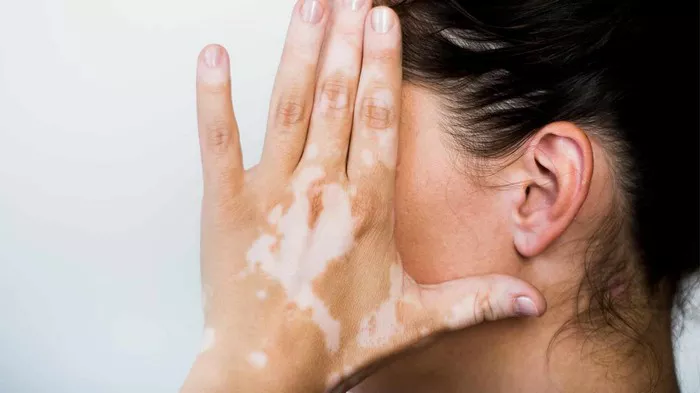Vitiligo is a chronic skin condition characterized by the loss of pigment, resulting in white patches on various parts of the body. This condition can affect individuals of all ages, genders, and ethnic backgrounds. Given its visible nature and potential psychological impact, seeking proper medical care is crucial for those affected by vitiligo. This article aims to provide a comprehensive overview of the types of doctors who treat vitiligo, their roles, and the approaches they take to manage this condition.
Dermatologists: The Primary Caregivers for Vitiligo
Dermatologists are medical doctors who specialize in the diagnosis and treatment of skin, hair, and nail disorders. They are typically the primary healthcare providers for individuals with vitiligo. Dermatologists play a pivotal role in the following areas:
1. Diagnosis: Dermatologists use various diagnostic tools, including a thorough medical history, physical examination, and sometimes a skin biopsy, to confirm a diagnosis of vitiligo. They may also use a Wood’s lamp, which emits ultraviolet light, to highlight areas of depigmentation.
2. Treatment Plans: Once vitiligo is diagnosed, dermatologists develop a personalized treatment plan. This may include topical corticosteroids, calcineurin inhibitors, and vitamin D analogs. For more extensive cases, they may recommend phototherapy (narrowband UVB or PUVA), depigmentation therapy, or surgical options like skin grafts or micropigmentation.
3. Monitoring: Regular follow-ups with a dermatologist are essential to monitor the progress of treatment and make necessary adjustments. Dermatologists also help manage any side effects of treatment and provide guidance on sun protection and skincare.
Pediatric Dermatologists: Specialized Care for Children
Pediatric dermatologists specialize in treating skin conditions in children, including vitiligo. Children with vitiligo may face unique challenges, such as bullying or social isolation, which can affect their emotional well-being. Pediatric dermatologists offer:
1. Child-Friendly Treatments: Pediatric dermatologists tailor treatments to be safe and effective for children. They may use lower-potency medications and less aggressive therapies to minimize side effects.
2. Psychological Support: Recognizing the emotional impact of vitiligo on children, pediatric dermatologists often work closely with psychologists or counselors to provide holistic care. They help children and their families cope with the social and emotional aspects of the condition.
Immunologists: Understanding the Autoimmune Connection
Vitiligo is believed to have an autoimmune component, where the body’s immune system mistakenly attacks melanocytes (pigment-producing cells). Immunologists specialize in understanding and treating autoimmune disorders and can be valuable in managing vitiligo, especially in cases linked with other autoimmune diseases.
1. Autoimmune Evaluation: Immunologists evaluate patients for other autoimmune conditions that may be associated with vitiligo, such as thyroid disease, type 1 diabetes, or alopecia areata. Comprehensive autoimmune screening helps in the overall management of the patient’s health.
2. Immune Modulation: In collaboration with dermatologists, immunologists may suggest treatments that modulate the immune system. This could include systemic therapies like oral corticosteroids, immunosuppressants, or biologics, particularly for widespread or refractory vitiligo.
Endocrinologists: Addressing Hormonal and Metabolic Factors
Endocrinologists specialize in the endocrine system, which includes glands that produce hormones. Vitiligo can be associated with endocrine disorders, particularly thyroid disease. Endocrinologists play a critical role in:
1. Thyroid Function Testing: Thyroid dysfunction is common in individuals with vitiligo. Endocrinologists perform tests to assess thyroid function and manage conditions such as hypothyroidism or hyperthyroidism, which may influence the course of vitiligo.
2. Hormonal Balance: Endocrinologists ensure that hormonal imbalances are addressed, which can help in the overall management of vitiligo. Proper hormonal balance is crucial for the effectiveness of vitiligo treatments and the patient’s general health.
Psychologists and Psychiatrists: Managing the Emotional Impact
Living with vitiligo can be emotionally challenging due to its visible nature and potential for social stigma. Psychologists and psychiatrists provide essential support for mental health:
SEE ALSO: What is the Best Cream for Vitiligo?
1. Counseling and Therapy: Psychologists offer counseling and cognitive-behavioral therapy (CBT) to help individuals cope with the emotional stress, anxiety, and depression that can accompany vitiligo. Therapy sessions can improve self-esteem and quality of life.
2. Medication Management: Psychiatrists can prescribe medications for depression or anxiety if needed. They work closely with dermatologists and primary care physicians to ensure a holistic approach to the patient’s well-being.
Primary Care Physicians: Coordinating Comprehensive Care
Primary care physicians (PCPs) often serve as the first point of contact for patients with vitiligo. They play a crucial role in:
1. Initial Assessment: PCPs conduct initial evaluations and refer patients to specialists such as dermatologists, immunologists, or endocrinologists based on the individual’s needs.
2. Ongoing Management: PCPs monitor the patient’s overall health, manage any comorbid conditions, and coordinate care among various specialists. They ensure that all aspects of the patient’s health are addressed in a cohesive manner.
Integrative Medicine Practitioners: Complementary Approaches
Some patients seek complementary and alternative medicine (CAM) approaches to manage vitiligo. Integrative medicine practitioners combine conventional and alternative therapies to provide a holistic approach to care:
1. Nutritional Support: Diet and nutrition can influence skin health. Integrative practitioners may recommend dietary modifications, supplements, or herbal remedies to support overall health and potentially improve vitiligo.
2. Stress Management: Techniques such as yoga, meditation, and acupuncture can help manage stress, which may play a role in the exacerbation of vitiligo. Integrative practitioners provide guidance on these complementary therapies.
Conclusion
Vitiligo is a complex condition that often requires a multidisciplinary approach to management. Dermatologists are the primary caregivers for vitiligo, but other specialists, including pediatric dermatologists, immunologists, endocrinologists, psychologists, psychiatrists, and primary care physicians, play essential roles in providing comprehensive care. Additionally, integrative medicine practitioners can offer complementary therapies to support overall well-being.
Effective management of vitiligo involves not only treating the skin but also addressing the emotional and psychological impact of the condition. By working with a team of healthcare providers, individuals with vitiligo can receive personalized care that addresses all aspects of their health, ultimately improving their quality of life.
Related Topics:
























